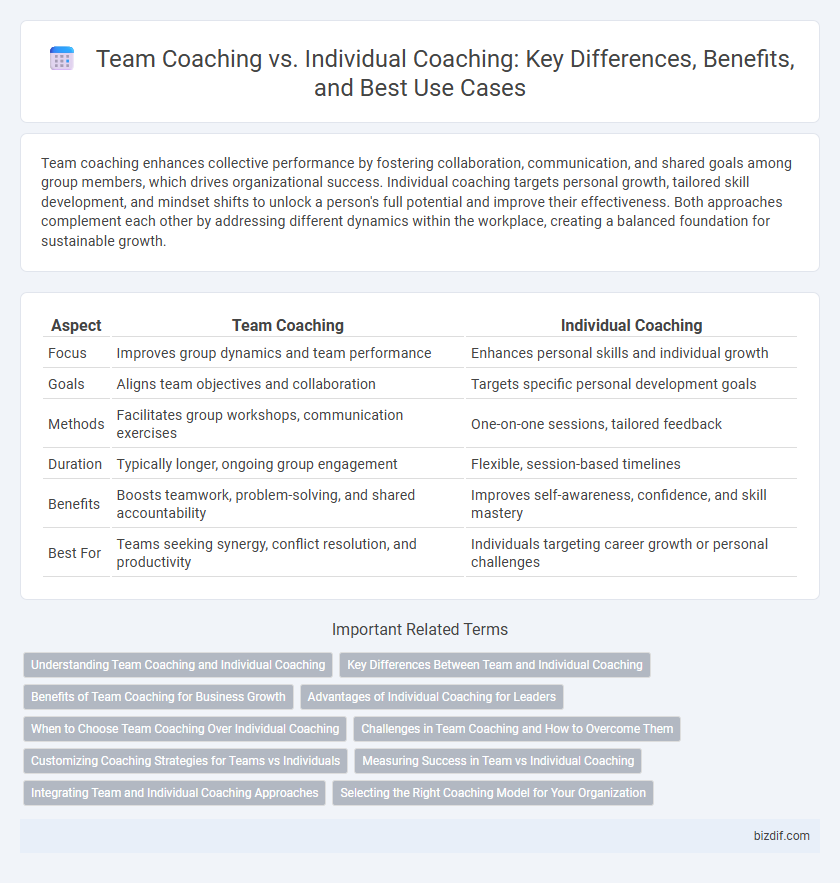Team coaching enhances collective performance by fostering collaboration, communication, and shared goals among group members, which drives organizational success. Individual coaching targets personal growth, tailored skill development, and mindset shifts to unlock a person's full potential and improve their effectiveness. Both approaches complement each other by addressing different dynamics within the workplace, creating a balanced foundation for sustainable growth.
Table of Comparison
| Aspect | Team Coaching | Individual Coaching |
|---|---|---|
| Focus | Improves group dynamics and team performance | Enhances personal skills and individual growth |
| Goals | Aligns team objectives and collaboration | Targets specific personal development goals |
| Methods | Facilitates group workshops, communication exercises | One-on-one sessions, tailored feedback |
| Duration | Typically longer, ongoing group engagement | Flexible, session-based timelines |
| Benefits | Boosts teamwork, problem-solving, and shared accountability | Improves self-awareness, confidence, and skill mastery |
| Best For | Teams seeking synergy, conflict resolution, and productivity | Individuals targeting career growth or personal challenges |
Understanding Team Coaching and Individual Coaching
Team coaching focuses on enhancing group dynamics, collaboration, and collective performance by addressing the entire team's goals and challenges. Individual coaching targets personal development, skill enhancement, and goal achievement by working one-on-one with a client to improve their leadership, communication, or specific competencies. Understanding the distinct objectives and methodologies of team versus individual coaching helps organizations choose the right approach to maximize growth and effectiveness.
Key Differences Between Team and Individual Coaching
Team coaching emphasizes group dynamics, collaboration, and collective goal-setting, while individual coaching targets personal development, self-awareness, and tailored growth plans. Key differences include communication patterns, accountability structures, and the scope of behavioral change, with team coaching fostering synergy and individual coaching enhancing specific skill sets. Success metrics vary; team coaching measures progress through team performance and cohesion, whereas individual coaching focuses on personal achievement and mindset shifts.
Benefits of Team Coaching for Business Growth
Team coaching enhances business growth by fostering collaboration, improving communication, and aligning group goals with organizational objectives. It accelerates problem-solving through diverse perspectives, boosting innovation and collective accountability. This approach cultivates a resilient corporate culture that adapts quickly to change and drives sustained competitive advantage.
Advantages of Individual Coaching for Leaders
Individual coaching for leaders offers personalized guidance tailored to specific leadership challenges, enabling deeper self-awareness and targeted skill development. It fosters confidential and candid conversations that promote trust and vulnerability, accelerating behavioral change and decision-making effectiveness. This focused approach enhances emotional intelligence and strategic thinking, empowering leaders to drive organizational success with greater confidence.
When to Choose Team Coaching Over Individual Coaching
Choose team coaching over individual coaching when the goal is to enhance group dynamics, improve collective problem-solving, and foster collaboration across team members. It is ideal for addressing organizational challenges that require a unified approach, aligning team goals with company objectives, and boosting overall team performance. Team coaching also works best when building trust, communication, and shared accountability within a diverse group is a priority.
Challenges in Team Coaching and How to Overcome Them
Team coaching often faces challenges such as managing diverse personalities, aligning conflicting goals, and fostering effective communication among members. Overcoming these obstacles requires establishing clear team objectives, facilitating open dialogue, and promoting trust through active listening and conflict resolution techniques. Utilizing frameworks like Tuckman's stages of team development can accelerate cohesion and collective performance.
Customizing Coaching Strategies for Teams vs Individuals
Customizing coaching strategies for teams involves addressing group dynamics, collective goals, and communication patterns to enhance collaboration and overall performance, while individual coaching focuses on personal development, specific skill enhancement, and tailored feedback aligned with one-on-one growth objectives. Effective team coaching requires techniques such as facilitated workshops and conflict resolution, contrasting with personalized action plans and introspective exercises used in individual coaching. Aligning coaching methods with the unique needs of teams or individuals maximizes engagement and achieves targeted outcomes.
Measuring Success in Team vs Individual Coaching
Measuring success in team coaching revolves around evaluating collective performance metrics, such as enhanced collaboration, improved communication, and achievement of shared goals, while individual coaching success is assessed through personal development indicators like skill acquisition, behavioral change, and goal attainment. Team coaching metrics often include feedback from group assessments, productivity analytics, and cohesion scores, whereas individual coaching relies on self-assessments, 360-degree feedback, and performance appraisals. Both approaches require tailored evaluation frameworks to accurately capture their respective impact on performance and growth.
Integrating Team and Individual Coaching Approaches
Integrating team and individual coaching approaches enhances organizational performance by addressing both group dynamics and personal development needs. This combined strategy leverages tailored individual coaching to improve specific skills while fostering collective accountability and collaboration through team coaching. Evidence shows that synchronization between these methods drives sustainable behavioral change and strengthens overall team cohesion.
Selecting the Right Coaching Model for Your Organization
Choosing the right coaching model depends on your organization's specific goals, culture, and team dynamics. Team coaching enhances collaboration, communication, and collective problem-solving, making it ideal for organizations aiming to improve group performance and synergy. Individual coaching focuses on personalized development, leadership growth, and tailored skill-building, best suited for addressing unique professional challenges and accelerating personal achievement.
Team Coaching vs Individual Coaching Infographic

 bizdif.com
bizdif.com